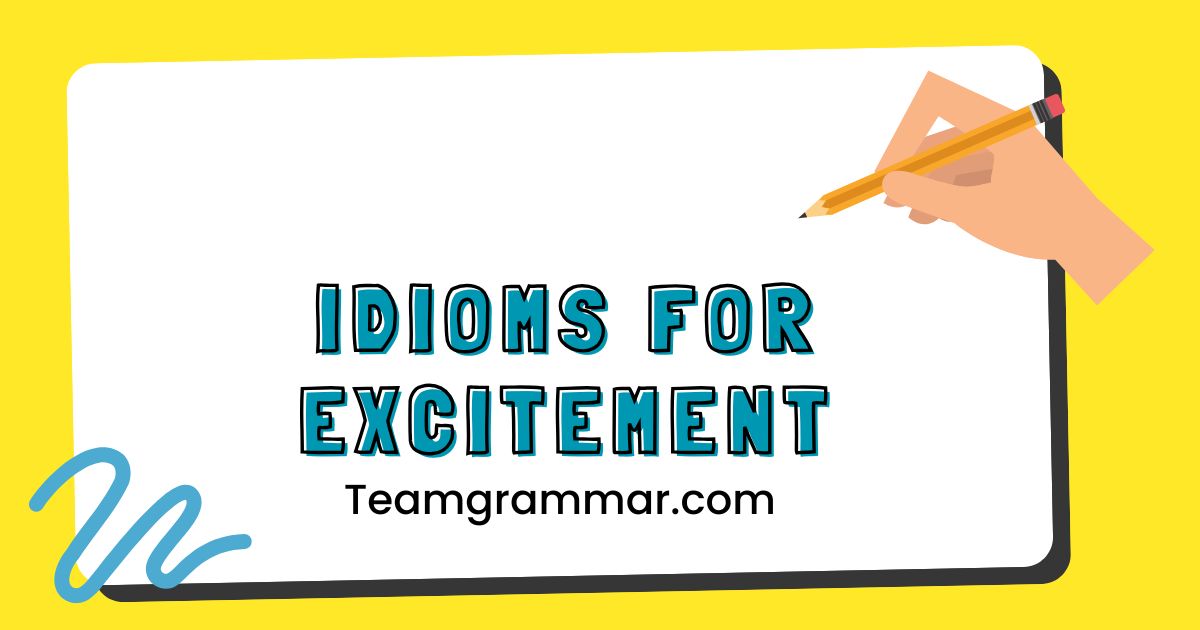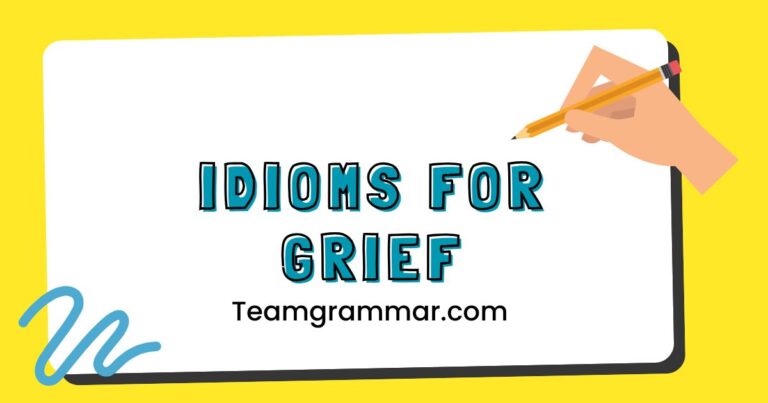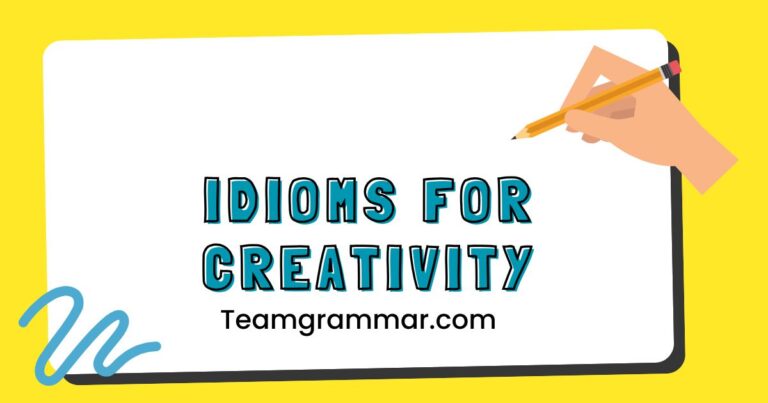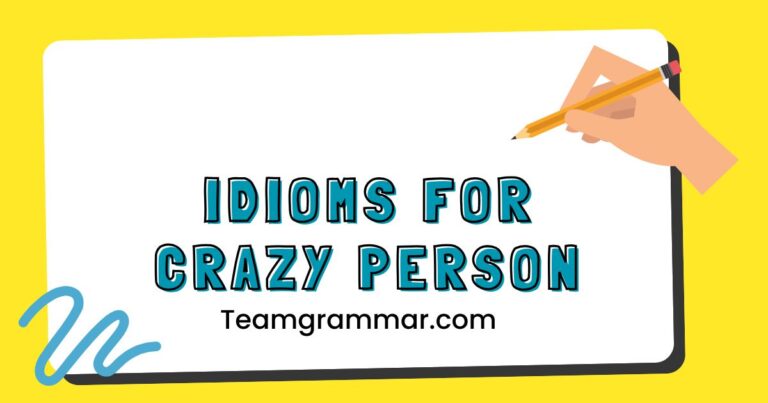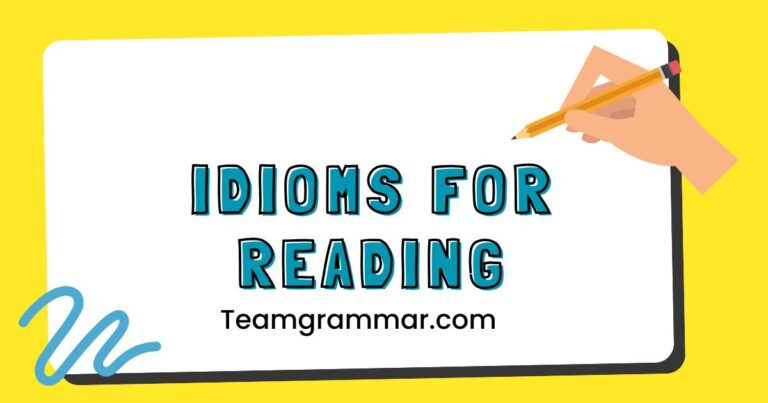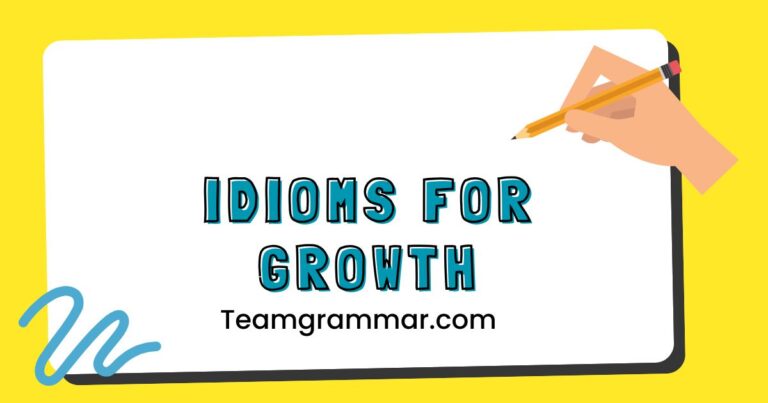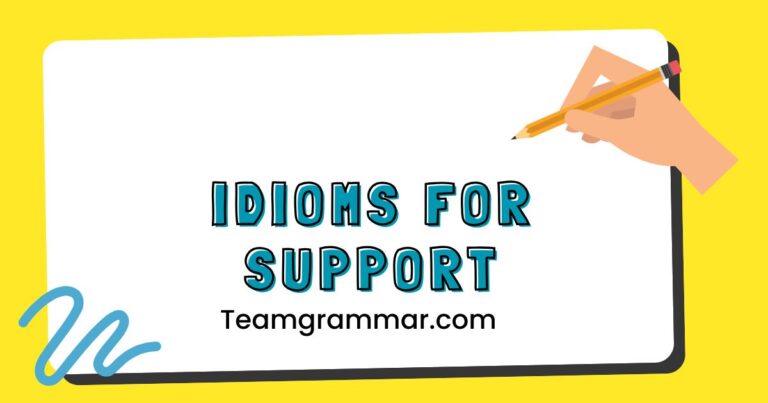31 Idioms For Excitement: Expressing Enthusiasm in English
Idioms are colorful expressions that add vibrancy and depth to the English language. Understanding idioms related to excitement allows you to express enthusiasm and joy in a more nuanced and engaging way.
Mastering these idioms can significantly enhance your communicative competence, making your speech and writing more vivid and relatable. This article is designed for English language learners of all levels, from beginners who want to expand their vocabulary to advanced speakers aiming to refine their expressive abilities.
By exploring the definitions, structures, and usage rules of these idioms, you will gain a deeper appreciation for the richness of the English language and improve your ability to convey excitement effectively.
Table of Contents
- Introduction
- Definition of Idioms for Excitement
- Structural Breakdown of Idioms
- Types and Categories of Excitement Idioms
- Examples of Idioms for Excitement
- Usage Rules for Excitement Idioms
- Common Mistakes When Using Excitement Idioms
- Practice Exercises
- Advanced Topics in Excitement Idioms
- Frequently Asked Questions
- Conclusion
Definition of Idioms for Excitement
An idiom is a phrase or expression whose meaning cannot be understood from the literal meanings of its individual words. Instead, the phrase functions as a unit with its own unique definition.
Idioms for excitement are a specific subset of idioms that are used to express feelings of enthusiasm, joy, anticipation, or thrill. These idioms are often colorful and figurative, adding emphasis and emotional depth to communication.
They are essential for conveying the intensity of one’s feelings and can make conversations more engaging and expressive.
The primary function of idioms for excitement is to amplify the emotional impact of a statement. Rather than simply stating that someone is happy, an idiom allows you to convey the *degree* and *nature* of that happiness.
For instance, saying someone is “over the moon” suggests a level of joy far beyond simple happiness. These idioms are commonly used in everyday conversation, literature, and media to depict characters’ emotions and reactions vividly.
The context in which an idiom is used is crucial for understanding its intended meaning. The same idiom can sometimes have different connotations depending on the situation and the speaker’s tone.
For example, “jump for joy” typically conveys positive excitement, but in a sarcastic context, it could imply the opposite. Therefore, it’s important to pay attention to the surrounding words, the speaker’s demeanor, and the overall situation to correctly interpret and use idioms for excitement.
Structural Breakdown of Idioms
Idioms, by definition, deviate from standard grammatical rules. Their structure often defies literal interpretation, making it essential to understand them as fixed expressions.
The structural components of idioms for excitement can vary widely, but they often include verbs, nouns, adjectives, and prepositions, combined in a way that creates a unique and non-literal meaning.
Many idioms for excitement involve verbs that depict movement or action, such as “jump for joy” or “be on cloud nine.” These verbs contribute to the sense of energy and enthusiasm associated with excitement. Nouns in these idioms often serve as metaphorical representations of emotional states or sources of joy, like “a kid in a candy store.” Adjectives are used to intensify the feeling of excitement, as seen in phrases like “tickled pink” or “absolutely thrilled.”
The word order in idioms is typically fixed, and changing the order can alter the meaning or render the idiom nonsensical. For instance, “over the moon” has a specific and recognizable meaning, while “the moon over” does not convey the same sense of ecstatic joy.
Prepositions play a crucial role in connecting the different elements of an idiom and establishing the relationship between the subject and the source of excitement. Understanding the structural elements of idioms helps learners recognize and use them correctly, enhancing their fluency and expressive capabilities.
Types and Categories of Excitement Idioms
Idioms for excitement can be categorized based on the type of excitement they express. These categories include physical excitement, emotional excitement, and anticipatory excitement.
Each category captures a different nuance of the feeling of excitement, allowing for a more precise and expressive communication.
Physical Excitement
Physical excitement idioms describe excitement that manifests in physical actions or sensations. These idioms often involve verbs related to movement, energy, or heightened physical awareness.
They convey a sense of exuberance and physical activity associated with intense excitement. Examples include jumping, shaking, or feeling butterflies.
Emotional Excitement
Emotional excitement idioms focus on the internal feelings and emotional states associated with excitement. These idioms often use metaphors to describe the intensity and nature of the emotional experience.
They can convey feelings of happiness, joy, elation, or overwhelming positive emotion. Examples include feeling “over the moon” or being “on cloud nine.”
Anticipatory Excitement
Anticipatory excitement idioms express the feeling of excitement leading up to an event or experience. These idioms often involve a sense of anticipation, eagerness, and eagerness.
They can convey the feeling of butterflies in your stomach or the thrill of waiting for something special. Examples include “on the edge of your seat” or “counting down the days.”
Examples of Idioms for Excitement
The following tables provide examples of idioms for excitement, categorized by the specific type of excitement they convey. Each idiom is accompanied by a definition and example sentence to illustrate its meaning and usage.
General Excitement
This table showcases idioms that express excitement in a general sense, without specifying a particular type or cause. These idioms are versatile and can be used in various contexts to convey a range of positive emotions.
| Idiom | Definition | Example Sentence |
|---|---|---|
| Over the moon | Extremely happy or delighted. | She was over the moon when she found out she got the job. |
| On cloud nine | Extremely happy; in a state of bliss. | After their wedding, they were both on cloud nine. |
| Jump for joy | To be extremely happy and excited. | He jumped for joy when his team won the championship. |
| Be tickled pink | To be very pleased or amused. | She was tickled pink to receive flowers from her secret admirer. |
| In seventh heaven | In a state of perfect happiness. | He was in seventh heaven when he finally met his idol. |
| Walking on air | To feel extremely happy and elated. | Ever since she got engaged, she’s been walking on air. |
| Have a blast | To have a great time; to enjoy oneself immensely. | We had a blast at the concert last night. |
| Be on top of the world | To feel extremely happy and successful. | After acing his exams, he felt like he was on top of the world. |
| Get a kick out of something | To find something very enjoyable or amusing. | I get a kick out of watching old movies. |
| Be thrilled to bits | To be extremely pleased and excited. | She was thrilled to bits when she received the acceptance letter. |
| Like a kid in a candy store | Very excited and eager, like a child in a candy store. | He was like a kid in a candy store when he saw all the new gadgets. |
| Buzzing with excitement | Filled with energy and excitement. | The whole office was buzzing with excitement about the upcoming holiday party. |
| Be on pins and needles | To be very anxious or nervous about something that is going to happen. | I was on pins and needles waiting for the results of my exam. |
| Can’t wait | To be very excited about something that will happen in the future. | I can’t wait for our vacation next month. |
| Eager beaver | A person who is very enthusiastic and hardworking. | She’s such an eager beaver, always volunteering for extra tasks. |
| Full of beans | To be lively and energetic. | The children were full of beans after their nap. |
| High as a kite | Extremely happy or elated. | She was as high as a kite after winning the lottery. |
| In high spirits | To be cheerful and happy. | The team was in high spirits after their victory. |
| On a high | In a state of excitement or euphoria. | He was on a high after performing on stage. |
| Overjoyed | Extremely happy or delighted. | They were overjoyed to welcome their new baby. |
| Upbeat | Cheerful and optimistic. | She’s always so upbeat, even when things are tough. |
| With bells on | Enthusiastically and with pleasure. | “Will you come to the party?” “With bells on!“ |
| Be all smiles | To be constantly smiling, showing happiness. | She was all smiles when she received the good news. |
| Be beside oneself with joy | To be overwhelmed with happiness. | They were beside themselves with joy when their daughter was born. |
| Be floating on air | To feel extremely happy and light. | After the successful presentation, he was floating on air. |
| Be grinning from ear to ear | To smile widely and happily. | He was grinning from ear to ear when he opened his birthday present. |
Thrilled
This section focuses on idioms that express a sense of being thrilled. These idioms often convey a feeling of intense pleasure and excitement, typically associated with positive surprises or achievements.
| Idiom | Definition | Example Sentence |
|---|---|---|
| Thrilled to bits | Extremely pleased and excited. | She was thrilled to bits when she got the acceptance letter from her dream university. |
| Absolutely thrilled | Completely and utterly delighted. | We were absolutely thrilled with the results of the experiment. |
| Overjoyed | Extremely happy or delighted. | They were overjoyed to hear that their son was coming home for the holidays. |
| Delighted | Feeling or expressing great pleasure. | I am delighted to announce that we have reached our fundraising goal. |
| Elated | Ecstatically happy. | She felt elated after winning the first prize in the competition. |
| On top of the world | Feeling extremely happy and successful. | After completing the marathon, he felt like he was on top of the world. |
| In high spirits | Cheerful and happy. | The team was in high spirits after their impressive victory. |
| In seventh heaven | In a state of perfect happiness. | He was in seventh heaven when he finally met his favorite author. |
| Tickled pink | Very pleased or amused. | She was tickled pink to receive such a thoughtful gift. |
| Walking on air | Feeling extremely happy and elated. | Ever since she got the promotion, she’s been walking on air. |
| Beside oneself with joy | Overwhelmed with happiness. | They were beside themselves with joy when they heard the news of their daughter’s recovery. |
| Floating on air | Feeling extremely happy and light. | After the successful presentation, he was floating on air. |
| Grinning from ear to ear | Smiling widely and happily. | He was grinning from ear to ear when he opened his birthday present. |
| High as a kite | Extremely happy or elated. | She was high as a kite after winning the lottery. |
| Like a dog with two tails | Extremely pleased and happy. | He was like a dog with two tails when he received the new bike. |
| Happier than a clam at high tide | Extremely happy and content. | She was happier than a clam at high tide spending the day at the beach. |
| On cloud nine | Extremely happy; in a state of bliss. | After their wedding, they were both on cloud nine. |
| Over the moon | Extremely happy or delighted. | She was over the moon when she found out she got the job. |
| On a high | In a state of excitement or euphoria. | He was on a high after performing on stage. |
| In raptures | Filled with intense joy or delight. | The audience was in raptures after the stunning performance. |
Eager
This table presents idioms that express eagerness or anticipation. These idioms often describe the feeling of looking forward to something with great enthusiasm and excitement.
| Idiom | Definition | Example Sentence |
|---|---|---|
| Can’t wait | To be very excited about something that will happen in the future. | I can’t wait for our vacation next month. |
| Eager beaver | A person who is very enthusiastic and hardworking. | She’s such an eager beaver, always volunteering for extra tasks. |
| On the edge of one’s seat | Very excited and attentive. | The audience was on the edge of their seats during the suspenseful scene. |
| Counting down the days | Eagerly anticipating an event. | We’re counting down the days until the concert. |
| Raring to go | Very enthusiastic and ready to start something. | The team is raring to go for the championship game. |
| Full of anticipation | Filled with excitement about something that is going to happen. | She was full of anticipation as she waited for the results. |
| Like a shot | Quickly and eagerly. | When the doors opened, they ran inside like a shot. |
| Waiting with bated breath | Waiting anxiously or excitedly. | The whole nation was waiting with bated breath for the announcement. |
| All agog | Full of intense interest or excitement. | The children were all agog at the sight of the circus performers. |
| Anxious to | Very eager to do something. | He was anxious to start his new job. |
| Champing at the bit | Eager and impatient to do something. | The runners were champing at the bit, waiting for the starting gun. |
| Antsy | Restless and impatient. | The kids were getting antsy waiting for the movie to start. |
| Burning with curiosity | Extremely curious and eager to know something. | She was burning with curiosity to find out what was in the box. |
| Looking forward to | Anticipating with pleasure. | I’m looking forward to seeing you next week. |
| Keen on | Very interested in or enthusiastic about something. | He’s very keen on learning to play the guitar. |
| On tenterhooks | In a state of suspense or agitation because of uncertainty. | We were on tenterhooks waiting for the phone to ring. |
| With great expectations | Anticipating something positive. | They went to the restaurant with great expectations. |
| Yearning for | Having a strong desire or longing for something. | She was yearning for a vacation after a long and stressful year. |
| Brimming with excitement | Full of excitement. | The children were brimming with excitement on Christmas Eve. |
| Hoping for | Wishing for something with anticipation. | We were hoping for good weather on our camping trip. |
Usage Rules for Excitement Idioms
Using idioms correctly requires an understanding of their specific meanings and the contexts in which they are appropriate. Here are some key usage rules for idioms of excitement:
- Context is Key: Always consider the context of the conversation or writing. Idioms can be informal and may not be suitable for formal settings.
- Know the Meaning: Ensure you fully understand the meaning of the idiom before using it. Misusing an idiom can lead to confusion or miscommunication.
- Audience Awareness: Be mindful of your audience. Some idioms may be unfamiliar to non-native speakers or people from different cultural backgrounds.
- Avoid Overuse: Using too many idioms in a short span can make your speech sound unnatural or forced.
- Grammatical Consistency: Maintain grammatical consistency within the sentence. Ensure that the idiom fits grammatically with the surrounding words.
Exceptions and Special Cases:While most idioms have fixed structures, some may allow for slight variations depending on the context. For example, you can say “He was over the moon” or “She is over the moon,” but the core structure of the idiom remains the same.
However, be cautious about altering idioms too much, as this can change their meaning or make them incomprehensible.
Common Mistakes When Using Excitement Idioms
One of the most common mistakes is misinterpreting the meaning of an idiom. Because idioms don’t translate literally, it’s essential to learn their intended meaning.
Another common error is using an idiom in the wrong context. For instance, using a very informal idiom in a formal presentation could be inappropriate.
Incorrect Example: “I am on cloud because I got a new pen.” (Misunderstanding the idiom.)
Correct Example: “I am over the moon because I got a new job.”
Incorrect Example: “The CEO was thrilled to bits about the quarterly earnings during the serious board meeting.” (Inappropriate context.)
Correct Example: “The team was thrilled to bits about the successful project completion.”
Another mistake is altering the structure of an idiom. Idioms are fixed expressions, and changing the word order or substituting words can change the meaning or make the idiom nonsensical.
Incorrect Example: “She was the moon over when she got married.” (Incorrect word order.)
Correct Example: “She was over the moon when she got married.”
Practice Exercises
Test your understanding of idioms for excitement with the following exercises. Fill in the blanks with the appropriate idiom from the list provided.
Idiom List: over the moon, on cloud nine, jump for joy, tickled pink, in seventh heaven, can’t wait, on the edge of their seats, full of beans, thrilled to bits, like a kid in a candy store
| Question | Answer |
|---|---|
| 1. She was ______________ when she received the scholarship. | thrilled to bits |
| 2. The children were ______________ after their nap. | full of beans |
| 3. We ______________ for our vacation next month. | can’t wait |
| 4. He was ______________ when he won the lottery. | over the moon |
| 5. The audience was ______________ during the suspenseful movie. | on the edge of their seats |
| 6. She was ______________ to receive such a thoughtful gift. | tickled pink |
| 7. He was ______________ when he finally met his idol. | in seventh heaven |
| 8. He ______________ when his team won the championship. | jumped for joy |
| 9. After their wedding, they were both ______________. | on cloud nine |
| 10. He was ______________ when he saw all the new gadgets. | like a kid in a candy store |
Exercise 2: Choose the correct idiom to complete each sentence.
| Question | Options | Answer |
|---|---|---|
| 1. After getting the promotion, she was ______________. | a) walking on eggshells b) walking on air c) walking on water | b) walking on air |
| 2. He was ______________ when he opened his birthday present. | a) grinning from ear to ear b) pulling someone’s leg c) beating around the bush | a) grinning from ear to ear |
| 3. The team is ______________ for the championship game. | a) sitting on the fence b) raring to go c) barking up the wrong tree | b) raring to go |
| 4. She’s always so ______________, even when things are tough. | a) under the weather b) upbeat c) down in the dumps | b) upbeat |
| 5. They were ______________ when they heard the news of their daughter’s recovery. | a) beside the point b) beside themselves with joy c) beside the sea | b) beside themselves with joy |
| 6. The children were ______________ on Christmas Eve. | a) brimming with excitement b) hitting the books c) calling it a day | a) brimming with excitement |
| 7. She was ______________ to find out what was in the box. | a) burning bridges b) burning with curiosity c) burning the midnight oil | b) burning with curiosity |
| 8. When the doors opened, they ran inside ______________. | a) like a shot b) like a broken record c) like a fish out of water | a) like a shot |
| 9. The whole nation was ______________ for the announcement. | a) waiting with open arms b) waiting with bated breath c) waiting with crossed fingers | b) waiting with bated breath |
| 10. She was ______________ spending the day at the beach. | a) happier than a pig in mud b) happier than a clam at high tide c) happier than a lark | b) happier than a clam at high tide |
Advanced Topics in Excitement Idioms
For advanced learners, exploring the nuances of idioms for excitement can involve understanding their historical origins, cultural significance, and subtle variations in meaning. Some idioms may have roots in ancient folklore, literature, or historical events, adding layers of complexity to their interpretation.
For example, the idiom “in seventh heaven” has religious origins, referring to the highest level of paradise in some belief systems.
Furthermore, advanced learners can delve into the use of idioms in different dialects of English. While many idioms are widely understood, some may be more common in certain regions or social groups.
Understanding these variations can enhance your ability to communicate effectively with people from diverse backgrounds. Also, consider how idioms evolve over time.
New idioms emerge, and existing idioms can change in meaning or usage.
Finally, idioms can be creatively manipulated in literature and media to create humor, irony, or emphasis. Authors and speakers may twist idioms or combine them in unexpected ways to achieve a particular effect.
Analyzing these creative uses of idioms can provide deeper insights into the expressive potential of the English language.
Frequently Asked Questions
- What is an idiom?
An idiom is a phrase or expression whose meaning cannot be understood from the literal meanings of its individual words. It is a fixed expression with a unique, non-literal meaning. - Why are idioms important in English?
Idioms add color and depth to the English language. They allow you to express yourself more vividly and engagingly, making your communication more effective and relatable. - How can I learn new idioms?
Read widely, listen to native speakers, and pay attention to the context in which idioms are used. Keep a notebook of new idioms and practice using them in your own speech and writing. - Are idioms the same in all English-speaking countries?
No, some idioms are specific to certain regions or countries. Be aware of these variations to avoid confusion. - Can I change the words in an idiom?
Generally, no. Idioms are fixed expressions, and changing the words can alter their meaning or make them nonsensical. - How do I know when to use an idiom?
Consider the context of the conversation or writing. Idioms are often informal and may not be suitable for formal settings. Also, be mindful of your audience and their familiarity with idioms. - What should I do if I don’t understand an idiom?
Ask for clarification. Don’t be afraid to ask the speaker to explain the meaning of the idiom. You can also look it up in a dictionary or online resource. - Are there any resources for learning idioms?
Yes, there are many dictionaries, websites, and language learning apps that focus on idioms. These resources often provide definitions, examples, and practice exercises. - How can I practice using idioms?
Use idioms in your own speech and writing. Try to incorporate a few new idioms each week. You can also practice with a language partner or tutor. - Is it okay to use idioms in formal writing?
It depends on the specific idiom and the tone of the writing. Some idioms may be too informal for formal writing, while others may be acceptable. Use your judgment and consider your audience. - What’s the difference between an idiom and a proverb?
An idiom is a phrase whose meaning is different from the literal meaning of its words, while a proverb is a short, well-known saying that expresses a general truth or piece of advice. - How do I avoid misusing idioms?
Always double-check the meaning and context of an idiom before using it. If you’re unsure, it’s better to use a more straightforward expression.
Conclusion
Mastering idioms for excitement is a valuable step toward enhancing your English language skills. These colorful expressions allow you to convey enthusiasm and joy in a more nuanced and engaging way.
By understanding the definitions, structures, and usage rules of these idioms, you can significantly improve your communicative competence and make your speech and writing more vivid and relatable.
Remember to pay attention to the context, be mindful of your audience, and practice using idioms in your own conversations and writing. Don’t be afraid to ask questions and seek clarification when you encounter unfamiliar idioms.
With consistent effort and practice, you can confidently and effectively use idioms for excitement to express your feelings and connect with others on a deeper emotional level. Embrace the richness and expressiveness of the English language, and enjoy the journey of learning and mastering these colorful expressions.

